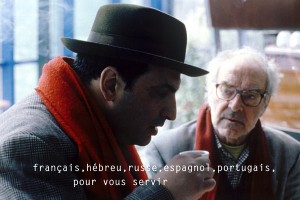Notre Musique – Language image and logic

In the beginning was the deed
![]()
![]()
![]()
![]()
![]()
Notre Musique – Director Jean-Luc Godard
If you love film – see this. If ideas engage you – see this. If you believe language and poetry embrace more than words – don’t miss this. Notre Musique shows a master film-maker on top of his game.
Most people who know film, have a Godard movie they love and, notoriously, at least one they were bored to tears by. Notre Musique is Godard’s forty-second feature film and all the skill and experience gained over the years is on the screen to see. Having like Sartre, wandered the side-roads of political abstraction for a while, Godard here has his feet fIrmly planted on a beautiful earth and his head struggling to bring some sense and wisdom to the implacably violent inhabitants of it. The philosophical soul of this movie is not Sartre but Camus, and the absolute sacredness of human life.
Technically the film is assured and confident. No flashy attention-grabbing tricks. The structure is elegant and effective and by no means as didactic as it sounds: there are three ‘chapters’ echoing Dante, The Kingdom of Hell, The Kingdom of Purgatory, and The Kingdom of Paradise. The first and last are about 10-15 minutes each; the first a devastating collage of images of war and wars: ‘fictional’ and ‘real’; documentary and imagined. Here Godard sets up the central theme of Notre Musique: the relationship between the scientific truth of empirical fact and perception; and the artistic truth of the spirit and imagination. He explores this deeply philosophical question in relation to history, cinema and art within the context of contemporary political conflict, especially that of Palestinian and Israeli, Arab and Jew.
The body of the film, The Kingdom of Purgatory is set at a literary conference in Sarajevo which provides a setting with an artistic purpose and an iconic physical significance of real, recent, human conflict and violence. Godard himself appears periodically as a thread of meaning objectified on screen, paralleling of course his constant ‘presence’ in the film as its director, controlling everything we see. A further subtle, representation of his underlying theme. Philosophically this film is very French in its conceptual pre-occupation with a dualism rooted in Descartes.
Visually NM is in turns devastating, stunning, lyrical. It is edited with what strikes me, as a near musical illiterate, as a consummate use of counterpoint, interweaving theme and sound, image, perception and thought. For me, the best image in the film that demonstrates the power of this conception is the three Native Americans shown in full traditional dress against the backdrop of the under repair bridge at Mostar. A people and a bridge; roughly contemporary, both destroyed by hatred and an instinct to violence and hate that mere preoccupation with empirical fact and perception will never address. Our destiny lies in our own hands: in this world not the ‘next’; and in our imagination, love of beauty and humility of the spirit; not in our knowledge, technology and arrogance of power.
The Native Americans, Indians, appear at points during Notre Musique as a kind of motif of warning: we can and do get it wrong. And we can’t put it right afterwards. Wake up call for a nuclear age. The Indians are a visual reminder of the consequences of the use violence and the worship of power at the expense of justice. Again counterpoint and paradox: the destruction by the arrogance of power of a culture which understood above all, the primacy of humility of the spirit.
Some movie. Some message. See it. If possible as it should be seen, at the cinema. Not reduced and domesticated by the ‘Bootsification’ of the TV frame.
(Zettel – May 2005)
Filed under: 5 stars, Documentary, Europe/World cinema, Jean-Luc Godard, Philosophical, Political

